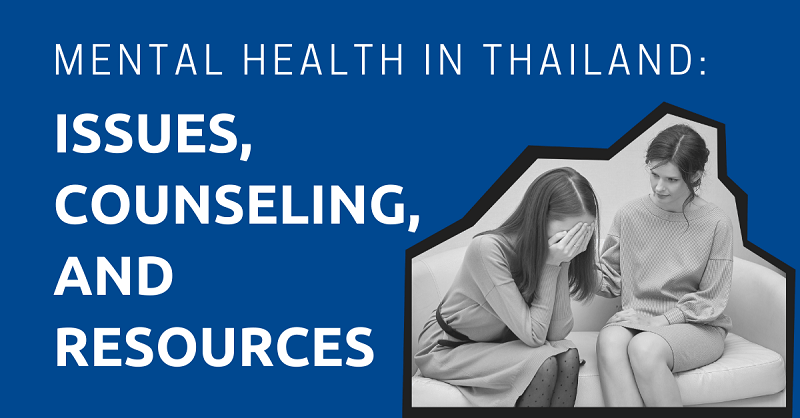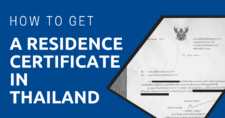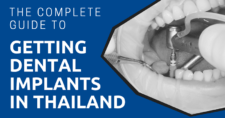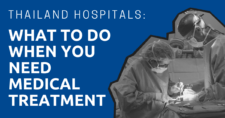
Do you know expats have a higher chance of having mental health problems? Being away from home and living in a new setting, you can develop stress, anxiety, or depression. The outcome of mental health problems can damage your life. Fortunately, Thailand has various treatment methods with counselors and psychiatrists qualified under western standards.
This article not only offers info about psychiatric and crisis services, counseling, and psychotherapy in Thailand. But I also talk about some real-life struggles and successes our readers have had while seeking help for mental health disorders in Thailand. Names have been omitted to protect privacy.
If you’re in crisis right now, please skip to the paragraph below on 3 emergency tips.
"*" indicates required fields
Disclaimer: This article may include links to products or services offered by ExpatDen’s partners, which give us commissions when you click on them. Although this may influence how they appear in the text, we only recommend solutions that we would use in your situation. Read more in our Advertising Disclosure.
Contents
What’s a Mental Health Issue?
Your mental health is as vital as your physical health. Mental problems are real. And overcoming them takes a therapist’s help.
But what, exactly, is going on? Do you have a mental health issue or are you unhappy? Are your emotions a normal, although painful, response to life events? Or are you in pain from serious mental issues?
As an expat, you may run into more mental health issues than you’d expect. A study in The International Journal of Mental Health said that:
“Individuals living as expatriates experience a range of risk at rates that exceed their U.S. based counterparts. Expatriates appear to experience higher risk for internalizing and externalizing problems, as well as higher risk for substance abuse.”
Online tests and popular ideas about mental health are misleading. So what can you do?
Think About It!
- Try to point out what you feel.
- Are you sad? Are you anxious? Do you suffer from low energy? or are you so wound up you can’t sleep?
- Are your reactions to life events different from the way they were before?
- Can you pick out issues such as sexual problems, relationship issues, bereavement, or traumatic memories?
- How long has this been going on? Can you tell when the problem first showed?
- How urgent does it feel? Trust that feeling and act on it.
Get Help
If you see a counselor or psychotherapist, they help you find the problem. They assess you. But they won’t label you with a mental illness. Though your treatment begins at the first session.
If you suffer from a mental health issue, the counselor works out a treatment plan with you.
If your unhappiness isn’t a mental health issue but your response to a life event, for example a loss, relationship trouble, or hardships in adjusting to Thailand, the counselor can help you by working through the process with you.
It might be a good idea to go (for more info see below). Talk it through with an experienced counselor. The counselor refers you to a psychiatrist if you need medication.
Remember counselors are there to help and advise you. But you’re the one who makes the decisions.
3 Emergency Tips
- Call the Samaritans.
- See a counselor this week.
- If your crisis is life threatening, go to an international hospital. Ask to see the psychiatrist on duty.
Mental health services are CONFIDENTIAL. They won’t pass anything you say to another person, unless you’re a danger to yourself or others (for example you want to commit suicide or a violent crime).
Call the Samaritans
The Samaritans are a world wide organization that offer a 24-hour crisis hotline staffed by trained volunteers. In Thailand, you can call the Samaritans English language service 24 hours a day, 7 hours a week on (02) 713–6791. But THIS IS A CALLBACK SERVICE. You get a call back from them within 24 hours. There’s also a Thai language service on (02) 713–6793 that is LIVE from 12 noon to 10PM. The Samaritans are anonymous, which means you don’t even have to give your real name.
The Thai government has two crisis hotlines in Thai as well. Call 1667 and 1323.
See a Counselor—Now
Counselors aren’t available 24/7. But if you can wait until the next morning, email a counseling center below or a private practitioner of your choice right now. Stress you’re in crisis and see them as soon as possible. And don’t cancel.
Counselors and psychotherapists won’t judge you. And together with you, they can work out what’s happening inside you. And they can create a treatment plan for you.
Two well-known counseling centers in Bangkok are NCS and PSI. They can find you a counselor. Private practitioners also see you on short notice if you’re in crisis.
And, although counseling is a process that lasts several weeks (or months), people report the first session with a counselor makes a difference to their mental well-being.
Counselors can also refer you to a psychiatrist in case you need medication.
In a Life Threatening Crisis, See the Duty Psychiatrist at an International Hospital
You can also walk into any international hospital, 24/7. Ask for the psychiatrist on duty. It’s vital the psychiatrist speaks good English.
Don’t talk about mental problems with a family member or friend. Hospitals ask you for payment or insurance. But don’t let that deter you if you’re in crisis. Your health is vital.
In Bangkok, Bangkok Hospital and Manarom Hospital have dedicated psychiatric units. But any psychiatrist can help you in an emergency.
If you see a counselor or psychologists, they assess you and help you find the problem.
And even though your treatment begins at the first session, they won’t label you with a mental illness.
The Most Common Mental Health Issues
Mental health issues come in many forms. Even if you’re feeling the least bit “off,” it’s important to seek help.
I knew something wasn’t right. I was losing my patience everyday with my family. I had bouts of anger, unrealistic lows and highs. It came to the point where I couldn’t do things like make big and small decisions. I knew I needed to get help, but I wanted a place that I’d feel comfortable going to, because of how mental health is perceived in Thailand. But I also knew my options were slim. – TSK Reader
Let’s look at some of the common mental health issues expats face, and where you can get help.
Depression
Although people use the phrase “I’m depressed” when they feel down, Clinical Depression is a diagnosis. Depression isn’t sadness, unhappiness, or exhaustion, although they can be symptoms of depression.
Depression is a significant, long-term low energy, low motivation state of inability to focus. It brings on negative thoughts and feelings of low self-worth. Life events trigger depression. But the causes are complex and may be hard to point out. Living in a foreign country without support networks can make you feel lonely and disconnected—and can trigger depression. Depression covers a wide range of severity. If you’ve had depression symptoms for more than two months (or less if they are severe), seek help. Experts must diagnose Clinical Depression.
Here’s a good reference to find out about depression.
Counseling and medication can treat depression.
Anxiety (Including Panic Attacks)
Fear isn’t in itself a mental health issue. Fear can be useful to protect you from danger. But a lasting state of fear, nervousness, and constant worrying can prevent you from functioning in your everyday life. In its clinical form, therapists can diagnose General Anxiety Disorder. Living abroad confronts you with life’s uncertainties. And these uncertainties can activate anxieties already present. If your worries become overwhelming and have a significant negative impact on your life, seek help.
As with depression, anxiety can be mild to moderate to severe, and is also related to stress. Panic attacks can be terrifying. They’re an overreaction of your stress response system. Anxiety problems may trigger attacks as well. Get expert advice.
Like depression, experts can treat anxiety. You can read here to find out about anxiety.
Childhood Trauma
Childhood trauma can cast its shadow over your entire life. The challenges of moving to another country and having to rebuild your life can reactivate traumatic memories. Childhood trauma comes from psychological and emotional abuse, neglect, bullying, and overprotection. The symptoms of childhood trauma can be like PTSD (Post Traumatic Stress Disorder) symptoms.
Childhood trauma can be the cause for symptoms of anxiety and depression. It can be treated in psychotherapy. Surviving childhood trauma and seeking help can be the beginning of a new life.
Adjustment Issues in Thailand
Adjusting to life in Thailand can bring out mental problems. How do you deal with isolation? The loss of social networks? How do you understand your role in Thai society? How do you find out what you want to achieve here?
Counseling can help you find solutions before those issues balloon into a serious issue.
Sexual Issues
Sex and sexuality aren’t talked about, or they’re talked about in harmful ways. Sexual issues and shame around sexuality can undermine your sense of self-wort. They can impact your relationships. Look for a counselor who specializes in sexual issues. You can assume they’ve heard it all. They won’t judge or shame you.
Sexual Orientation
Sexual choice isn’t a mental health issue. But problems arise from the way some people treat others with differing sexual choices. If you’re LGBTQIA (lesbian, gay, bisexual, transgender, queer, intersex, or asexual), you may want to find a counselor who knows your choice and life issues. Look for LBGTQIA links in the resources below.
Relationship Issues
Close relationships can bring out the best and the worst in us. Intercultural couples have an extra level to deal with.
Couples counseling helps you to talk to each other better. Look for a specialist in couples counseling.
Eating Disorders
Eating problems like bulimia, binge eating, and anorexia affect much of the population in Thailand—both Thais and foreigners. They’re best treated by medical doctors, counselors, and nutritionists. If an eating problem is severe and needs long-term in-house help, it might be best to return to your home country. If a teenager suffers from an eating disorder, make contact with the school counselor and ask them for a referral.
Treatment
Addiction Recovery
Recovery from addiction needs daily attention, even in the early stages. The most successful way to manage addictions is AA (Alcoholics Anonymous). They also have affiliates for drugs, overeating, gambling, and other addictions. AA holds anonymous meetings with addicts and ex-addicts. They also have a volunteer sponsorship model that offers mentoring from AA members with more than 2 years sobriety.
In Bangkok, Chiang Mai, Pattaya, Hua Hin and other tourist areas, English language AA meetings are available. AA also has online forums and Thailand based Skype meetings. It’s free and effective.
In-house addiction help is available at various centers in Thailand. See the resources below.
If you’re struggling with a severe addiction and need extended in-house treatment and help, consider going back to your own country for help.
Counseling and Psychotherapy
Counseling and psychotherapy are alike. They’re the so-called talking therapies. The therapist guide you to show your issues, find out what caused them, and create solutions. Counseling means a series of sessions, depending on the nature and issue’s severity.
The counselor is there to understand you and help you. Therapy is non-judgmental and confidential. The goal is to help you take charge of your own life. Counselors and psychotherapists have years of training, accredited in their own countries.
The talking therapies have a high success rate.
While choosing a counselor, use your common sense. You need to be able to trust your counselor. They need to be able to get you. A counselor also challenges you and make change easier. Finding the right counselor is already part of the recovery journey. You also need to trust the psychiatrist and their knowledge of the right medication. Don’t hesitate to ask questions.
Counselors and psychotherapists follow different schools of therapy. But adapt their approach to the client’s needs. If you’re new to counseling, don’t hesitate to ask questions about the therapist’s methods and the theories behind them. But don’t forget the relationship between client and therapist is the most powerful healing tool.
Here’s a link with brief explanations about different therapy types.
Psychiatrists and Medication
A psychiatrist is a medical doctor who has extra training in psychiatry, the medical field of mental problems. In Thailand, a doctor can give medication. Insist on seeing a psychiatrist, not a general practitioner, for prescriptions.
Bangkok Hospital, Manarom Hospital, and Chulalongkorn Center have psychiatrists, counselors, and other health care experts. Counseling centers like PSI and NCS and private therapists who can refer you to the psychiatrists and hospitals they work with.
In Thailand, psychiatrists may not refer you to counseling. But in some countries, the two professions work together.
Don’t hesitate to ask questions about your medication.
While you can see a psychiatrist at an international hospital in Bangkok and Chiang Mai, coverage is poor outside those cities.
There is only one licensed psychiatrist for every 250,000 people. The public health target is to have one psychiatrist for every 100,000 people. In Thai culture, it’s not common to seek therapy unless the symptoms of mental illness are apparent. Conservative Thais generally have a bad perception of people who go to therapy. – Dr. Somrak Chuwanichawong, of Bangkok’s Srithanya Hospital
Info about the difference between psychiatrists and psychotherapists—psychologists in America.
In-house Treatment
You can treat most mild to moderate mental problems while you go on living your life. You can test out solutions created in therapy, repair relationships, and improve circumstances. In-house help is necessary when you can no longer function in your life. A few hospitals in Bangkok offer in-house treatment if your insurance covers it.
In-house help for addiction is also available. But, if your issue prevents you from functioning for a long time, or if it’s severe, it may be best to make arrangements for treatment in your home country. Recovery is easier if you don’t have to struggle so much with cultural differences, you may be closer to friends and family, and help may be affordable or free.
Involuntary Psychiatric Treatment (Certified or Sectioned)
As in most countries, it’s possible in Thailand to treat people with severe problems who may be a danger to themselves or others against their will if a psychiatrist decides it’s necessary.
But, in Thailand, like in most countries, this is a hard process and involves Thai legal procedures. In practice, situations where experts encourage foreigners to return to their home countries for help rarely happens. It’s a good idea to have a living will that names a responsible person in Thailand who can decide treatment options on your behalf if you become mentally incapable. Carry the name and contact details of that person.
Experts Who Work with Children and Adolescents
Most international schools have school counselors who can assess your child’s mental health needs and also offer therapy sessions for them. Seeing the school counselor is smart, and not a sign of failure. The school counselor can also refer your child to therapists and, if necessary, psychiatrists. The Merak Clinic in Bangkok is an integrated mental health care center for children and adolescents, treating issues like autism, ADHD, and others. Some private practitioners are also trained and experienced in working with children. Make sure the counselor works with the right age group before you see them.
Couples Counseling
I wish we had come to couples counseling earlier! That’s the most common comment by clients. Couples counseling is learning how to talk effectively, openly, and with curiosity and compassion, as well as learning conflict resolution. Couples counseling can’t save your relationship. But it can help you both find out what you want in this relationship and how to negotiate the best outcome. Ask if your counselor can refer you to an expert in couples counseling.
EAPs Employee Assistance Programs
Companies have Employee Assistance Programs—although in Thailand you may not be aware of that option. Don’t hesitate to find out from your HR office. They may have this program available especially when you are working in a place like international schools. Employees and their family members are entitled to a certain number of counseling sessions per year, paid for by the company.
The counseling is confidential. And your employer won’t know what you said. In serious cases, experts can refer you to further help.
Self-help and Wellness
From traditional massage to meditation to self-care groups, Thailand has it. Mental problems respond well to treatment. Learn how to meditate at a monastery or an English language meditation centre such as Little Bangkok Meditation Center or Rojana Dhamma Center.
Join a yoga retreat, practice Yoga, Qi Gong, or Alexander Technique at a Yoga Center, and enjoy the medical benefits at a traditional Thai massage school. If you live in Bangkok, Hua Hin or Chiang Mai, you can research meet-ups and self-help groups that can help to bring back joy to your life.
Physical exercise and mental stimulation are crucial in treating depression and anxiety. Building friendships with like minded people and engaging with the world can help you manage mental problems.
Remote Counseling
If you live upcountry, you may have to rely on remote counseling via Skype or Zoom. But counselors who live in Thailand want to see you in person at least once. There are also reputable online counseling resources if you want to work with a counselor from your own country.
If you get prescriptions for medication, you have to see your psychiatrist in person.
The Language of Mental Health
Because mental health treatment relies on talking, language is crucial.
Most international counselors in Thailand practice in English. But you can also find a counselor in a main European language or in Japanese and Mandarin if you live in Bangkok or Chiang Mai. Ask a counseling center to help you with a referral.
Psychiatrists at international hospitals speak good English. If you live upcountry, travel to a big city hospital first to see a psychiatrist for diagnosis and prescriptions, and then ask them to refer you to a local hospital. Have regular check-ups with the psychiatrist.
Treatment in Thailand vs. Returning Home for Treatment
Counselors and psychiatrists at international hospitals work according to western standards. They also work with expats and know their situation. Whether you’re traveling or living in Thailand long term, you get great help here.
The exceptions are the severe and long-term mental problems that need in-house help. In those cases, returning home might be a better solution, both financially and in terms of the right treatment and support networks. This also includes long-term help for addiction. If you live upcountry, you may have to travel to get treatment.
Insurance for Mental Health Issues
Not all insurance plans cover you for psychiatric care. If a plan does cover you, you have to wait ten months before you can use it to see a psychiatrist.
Travel insurance usually doesn’t cover it.
Some insurances need co-payments for mental problems. Research your insurance options.
But health insurance may have a waiting period of 10 months. So, you may want to get it as soon as you come to Thailand. This way you can see a psychiatrist when you want, without having to wait.
Some counseling centers may also offer social discounts on a sliding scale if you make little income and don’t have insurance.
Resources
Note: Services below come in Thai and English. Some have Thai website. But based on my research, recipients respond in English.
Hospitals with Dedicated Mental Health Centers
I was helping someone who had taken an overdose of medication on purpose. I took him to Manarom Hospital. I was shocked that they tied the guy up to the bed. But apparently that’s fairly common. I thought the staff took good care of him despite language barriers. I’d recommend the hospital to anyone who needs help. – A German friend of Karsten
- International hospitals in Bangkok such as Bumrungrad, BNH, and Samitivej have psychiatrists on duty.
Counseling Centers
- PSI (Psychological Services International): Bangkok’s largest and most central counseling center. Wide choice of international and Thai counselors.
- NCS (New Counseling Service): Bangkok’s longest serving counseling center going back almost 20 years. International and Thai counselors.
- Center for Psychological Wellness at Chulalongkorn University: They have a low-cost service for the general public staffed by Chulalongkorn counselors and psychiatrists on site. There may be a waiting list.
- Bangkok Community Resources: A comprehensive list of services.
- The Life Change People: Life-Changing holidays and couples retreats in Chiang Mai.
They really helped me a lot. Seven years ago my Thai wife died of aids and I was left to look after her daughter. Without the help of Chrissy and Alex from The Life Change People, I wouldn’t have been able to cope with everything. – Ozzi Jarvinen, owner of Iglu.net
Psychiatric Services in Thai Hospitals Outside Bangkok
English language levels vary. Ask before you go. Insist on seeing the psychiatrist for prescriptions, not the family doctor. Don’t rely on family to translate.
Addiction services
- AA: Alcoholics Anonymous
- The Cabin: Counseling center in Bangkok and in-house help centers in Chiang Mai
- Dara Thailand: In-house treatment in Chantaburi and Ko Chang
- Inspire rehab: In-house help in Bangkok
Crisis Hotlines
Samaritans of Thailand: [email protected]
Bangkok
(02) 713 6793 (Thai)
12:00 noon to 22:00
(02) 713–6791(English call back service within 24 hours)
Chiang Mai
(053) 225–977/8 (Thai)
9:00 – 22:00
Mon., Tues., Thurs., Sat.)
Thai language government hotlines 1667/1323
PLEASE NOTE: THESE NUMBERS WORK FROM EVERYWHERE IN THAILAND.
Resources for Children and Adolescents
- Merak Clinic: The clinic most schools and counselors prefer. Specialized treatment by experts in mental health care for children and adolescents.
- BAMBI: Mother and baby support groups.
LGBTQIA Resources
- Thai Red Cross and Research Centre: Offers counseling in English.
- Tangerine Center: Offers holistic services to the transgender community.
Self-Care, Relaxation, Meditation
- Little Bangkok Sangha: Offers meditation events and retreats in English.
- Rojanna Dhamma Foundation: Offers events and meditation in central Sukhumvit.
- You can research Yoga Centers online.
Please note: The information provided by ExpatDen is not intended to replace or serve as a substitute for medical or healthcare advice. It is strongly recommended that you seek guidance and consultation from a licensed medical practitioner or qualified healthcare professional pertaining to your specific circumstances and healthcare needs.









I keep telling the voices in my head I don’t have a mental problem but they just won’t listen to me.
They even started a barber shop quartet but won’t let me join.
Now it’s not only just voices, now their damn well singing.
(Gotta admit, they do sound a rather good quartet tho)
Hi, As a young person specific substance misuse practitioner in the UK, now residing in Thailand,
I was interested to see the section on “Resources for children & adolescents” having previously struggled to find any in Thailand.
The link provides ‘Teenrama’ as the resource for young people, not sure if you’re aware but this link is a domain selling site?.
Is there any services / support / education specifically designed for Thai young people that you are aware of?.
Thanks.
Andy.
Thanks for pointing “Teenrama” out. We didn’t aware that the link is no longer available.
Regarding your question, you can check out the Samaritans (https://www.samaritansthai.com/). But not sure they are available at the moment or not because of COVID-19.
I am a 43 year old gentleman from the UK with Trigeminal Neuralgia (severe head nerve pain) who is prone to panic attacks and severe anxiety. I have been prescribed diazepam for the flights only, but not for the duration of my 35 day stay in Thailand. Is it possible to see a Doctor in Thailand about my condition so I can get the 10mg every three days I will need to enjoy my vacation with more control over my symptoms? If so, which Doctor would you recommend. Thank you for taking time to read.
Not an expert on this, so take it with a grain of salt, but here’s my take: It’s a restricted substance so the likelihood of being able to confirm in advance that a doctor in Thailand will prescribe it is very low. Your best odds would be to get a prescription from your doctor in the UK (which you’ll have to carry on you / bring with you to Thailand in case you get into a police check).
There are also more options as listed on rehabs.asia for mental health treatments and dual diagnosis. Perhaps the leading mental health provider outside Bangkok is Miracles Asia in Phuket.
Our company, Bangkok Counseling Service (bangkokcounsellingservice.com), is missing from the Counseling Centers list. We provide counseling, psychotherapy, psychological and mental health support to individuals, couples, families, young people & groups in English and Thai.
Hello,
I am a clinical counsellor, previously in private practice in Canada. Since emigrating to Thailand a few months ago, I have been asked a few times to provide counseling services to expats in Pattaya. I have looked online but can not find any information on Colleges or Professional Licensing bodies in Thailand, are there any? Other than the requirement to obtain a work visa, are there any other barriers to starting work? Thanks in advance for any help you may be able to offer.
Steve Small MC
Hey Steve – apologies for the delayed reply, I just saw this. Unfortunately I’m not familiar with the actual procedures for certification for counseling. In case you want to do this as an employee or volunteer, , I assume you can reach out to the counseling centers listed in the article. In case you’re looking to open a business, a law firm that has some experience health services may be of help. I think you could find a lawyer knowledgeable about the area at Tilleke & Gibbins (tilleke.com)